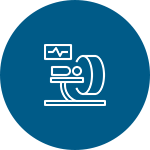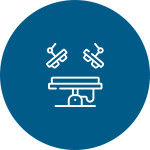The Benefits of Early Gallbladder Removal for Gallstones
Reading Time: 7 minutes Spread the love Introduction The Benefits of Early Gallbladder Removal for Gallstones. Gallbladder stones, also known as cholelithiasis, are small hard deposits that…
Dr AvinashTank, is a super-specialist (MCh) Laparoscopic Gastro-intestinal Surgeon,




Dwarika Super-speciality Hospital is the best laparoscopic surgery hospital in Ahmedabad, India.
We offer compressive cancer care programme where you will get most appropriate treatment of liver, pancreas & gastro-intestinal cancer treatment without any side effects.
Our centre is having most experienced and super-specialist cancer doctor of Ahmedabad along with team of physician, intensivist, dietician and specialized physiotherapist to take care of all & high-risk person.
Our centre is equipped with all latest facilities to deliver world class treatment.
We got privileged to treat not only the peoples of various corners of country, like Rajasthan, Delhi, Mumbai, Chennai but also the peoples of various corner of continents like USA, Canada, UK, Australia, Afrika, UAE. Thus we are most preferred destination for all people of world for laparoscopic surgery of gall-bladder, acidity (reflux/ GERD), hernia (incisional, hiatus, diaphragmatic, inguinal, femoral), rectum prolapse, spleen & piles (haemorrhoids).








Get treatment by most -experienced and superspecialist doctors & his Team

We care through-out the journey of treatment

Large size wheelchairs, stretcher, OT table

Ready to resolve any query at any time

No or negligible pain after surgery

Very small cut, may not be visible after sometime

Liquid diet is started 6 hours after the surgery

You will be home after 2nd day

Experience
Award & Presentations
Satisfied Families
Successful Surgeries

Endoscopy

Gall-bladder is a small organ lies just below liver on right upper abdomen. Gall-bladder stores bile...

Appendix is a vestigial organ in human being, attached to right colon. The appendix produces a bacteria...

Hernia is a bulging of abdominal organ through a weakened muscle area. Except for Congenital umbilical...

Gastroesophageal reflux disease (GERD) is a chronic digestive disease that occurs when stomach acid...

Haemorrhoids are vascular structures in the anal canal which help with stool control. They become..
Lorem ipsum dolor sit amet, consectetur adipiscing elit. Ut elit tellus, luctus nec ullamcorper mattis, pulvinar dapibus leo.
Lorem ipsum dolor sit amet, consectetur adipiscing elit. Ut elit tellus, luctus nec ullamcorper mattis, pulvinar dapibus leo.
Lorem ipsum dolor sit amet, consectetur adipiscing elit. Ut elit tellus, luctus nec ullamcorper mattis, pulvinar dapibus leo.
Lorem ipsum dolor sit amet, consectetur adipiscing elit. Ut elit tellus, luctus nec ullamcorper mattis, pulvinar dapibus leo.
There are no strict dietary restrictions, but some people find fatty foods less tolerable.
As with any surgery, there are risks like infection or bleeding, but these are uncommon.
Yes, you can live a normal life without a gallbladder. Your body adapts bile release.
Recovery is usually quick (a few days) with laparoscopic surgery.
Laparoscopic cholecystectomy is usually an outpatient procedure taking 30-60 minutes.
Ultrasound is the most common test to detect gallstones.
Untreated gallstones can cause complications like infection or pancreatitis.
Dissolving medications exist but are uncommonly used due to limitations and side effects.
Cholecystectomy is the surgery to remove the gallbladder. It’s typically laparoscopic (minimally invasive).
Not all gallstones cause problems. Removal is usually recommended if you experience pain (gallbladder attacks).
In general, laparoscopic surgery tends to be more expensive than open surgery due to several factors.
The equipment required for laparoscopic surgery, such as specialized instruments, video monitors, and high-resolution cameras, can be costly.
Additionally, laparoscopic surgery often requires more advanced training and expertise from the surgical team, which can contribute to higher costs.
The benefits of laparoscopic surgery for digestive organs is remarkable; less pain, early return to home and early return to work save a lot of indirect expenses.
So at the end, the cost of laparoscopic surgery is equal or marginally higher with open surgery at the end of 3 to 6 months.
Recovery after laparoscopic surgery is often faster and less painful compared to open surgery.
The hospital stay is usually shorter, typically ranging from a few hours to a few days, depending on the procedure and individual factors.
Patients may experience some discomfort or soreness around the incision sites, but this can be managed with pain medications.
It’s important to follow the surgeon’s instructions regarding activity restrictions, wound care, and medication usage during the recovery period.
While laparoscopic surgery is a versatile technique, it may not be suitable for all patients or conditions.
Factors such as extensive scarring from previous surgeries, certain medical conditions, or anatomical complexities may make open surgery a more appropriate option.
The decision regarding the suitability of laparoscopic surgery is typically made by the surgeon based on individual patient factors and the specific procedure required.
While laparoscopic surgery is generally considered safe, there are potential risks and complications involved.
These can include bleeding, infection, damage to surrounding organs or blood vessels, adverse reactions to anaesthesia, blood clots, hernias at the incision sites, and the need to convert to an open procedure if complications arise.
However, the overall risk of complications is typically lower compared to traditional open surgery.
During laparoscopic surgery, several small incisions, typically less than an inch in length, are made in the abdomen.
Carbon dioxide gas is then pumped into the abdomen to create space for the surgeon to work.
The laparoscope, along with other specialized instruments, is inserted through these incisions.
The surgeon guides the instruments while watching a high-definition video feed from the laparoscope.
The procedure is performed with the assistance of the surgical team, who manipulate the instruments as directed by the surgeon.
Laparoscopic surgery can be used to perform a wide range of procedures, including but not limited to gallbladder removal (cholecystectomy), appendix removal (appendectomy), hernia repair, weight loss surgery, gastric bypass surgery, colorectal surgery, Diabetes surgery and cancer surgery of all organs of digestive systems.
Laparoscopic surgery offers several advantages over traditional open surgery, including smaller incisions, less postoperative pain, reduced blood loss, shorter hospital stays, faster recovery times, and smaller scars.
It also provides improved visualization of the surgical area and can be associated with fewer complications.
Laparoscopic surgery, also known as minimally invasive surgery or keyhole surgery, is a surgical technique that uses small incisions and specialized instruments to perform procedures inside the abdomen or pelvis.
It involves the use of a laparoscope, which is a thin, lighted tube with a camera attached, allowing the surgeon to view the internal organs on a monitor.
Maecenas condimentum, magna id mollis scelerisque, sapien quam consectetur mauris, id blandit nunc velit vel diam. Fusce id imperdiet quam, eget pharetra massa. Aenean sed venenatis purus. Maecenas sagittis ante eu lorem ultricies, eu dapibus mauris cursus. Maecenas vitae egestas massa, quis congue arcu. Quisque egestas quam vitae sagittis pretium.
Median Arcuate Ligament Syndrome( Compression of Coeliac Artery). Dr Avinash Tank. Dwarika Hospital
Beat Treatment of Liver Cirrhosis with Gallbladder Stone in Ahmedabad. Dr Avinash Tank Dwarika Hosp.
Best Inguinal (B/L) Hernia treatment doctor in Ahmedabad. Dr Avinash Tank, Dwarika Hospital.
Laparoscopic Cholecystectomy. Dr. Avinash Tank. Dwarika Hospital, Ahmedabad.
Laparoscopic Appendectomy. Dr Avinash Tank, Dwarika Hospital.
Laparoscopic Cholecystectomy. Dr. Avinash Tank. Dwarika Hospital, Ahmedabad.
Acute Cholecystitis with Liver Abscess. Dr Avinash Tank. Dwarika Hospital.
दिन प्रतिदिन बढ़ता वजन। Best treatment of Obesity. Dr Avinash Tank. Dwarika Hospital.
Gallbladder में "Stone" की वजह से परेशान दर्दी का कैसे हुआ इलाज? Dr Avinash Tank. Dwarika Hospita.
![]()
Treat in the best way and very highly recommended as bariatric surgeon in Ahmedabad to everybody & especially to desperate people who try to solve their obesity problem. Thanks, Dr. Avinash Tank.
![]()
It was a really good experience for bariatric surgery in Ahmedabad. I suggest to all who are fighting with obesity to visit Dwarika Clinic and meet Dr. Avinash Tank.
![]()
Thanks for the Google users for sharing there views and rating about Dr. Avinash Tank on Google. Overall experience about doctor is more than five star. Doctor & staffsare very nice and there behavior likes a family with visitors and patient. God grace I found Dr. Avinash Tank for weight loss surgery in Ahmedabad through Google and had remedy for my problem. Thanks again and wish best luck for future.
Reading Time: 7 minutes Spread the love Introduction The Benefits of Early Gallbladder Removal for Gallstones. Gallbladder stones, also known as cholelithiasis, are small hard deposits that…
Reading Time: 2 minutes Spread the love Gallstones are a common medical issue that affects many individuals. Are there natural ways to dissolve 20 mm…
Reading Time: 2 minutes Spread the love Choosing the Best Gallbladder Surgeon in Ahmedabad: What to Look For When faced with the need for gallbladder…

With access to
A small river named Duden flows by their place and supplies it with the necessary regavelialia. It is a paradise.